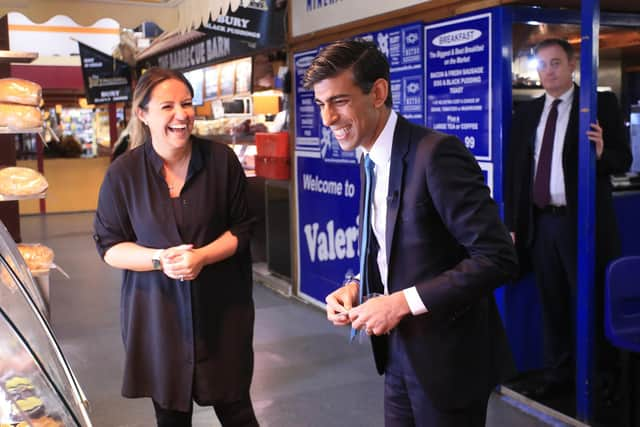Autumn Budget 2021: Rishi Sunak's vision for Britain has been stunted by a lifetime among a self-serving elite – Joyce McMillan
He certainly, like her, has a comfortable home and a happy disposition; and like her, he seems to unite some of the best blessings of existence.
Yet yesterday, this apparently bright man stood up in the House of Commons, at a profound turning-point in the story of the UK and the planet, and proceeded to budget like it was 1979, at least in terms of the rhetoric he deployed.
Advertisement
Hide AdAdvertisement
Hide AdOf course, he could not avoid the fact that because of the trauma of the pandemic, British state spending has soared over the past 18 months to levels previously regarded by Tories as unthinkable, with spending at its highest level relative to GDP for at least a generation.
Yet faced with this historic opportunity to reshape British public spending in ways that would actually support the government’s stated goals – with massive investment in carbon reduction, in science and technology, in decentralising power and “levelling up”, and in the kind of educational system that might really produce a high-skilled, high-productivity workforce – the Chancellor instead splashed his cash on a few tightly targeted running repairs to the benefits system, on a re-jigging of taxes on alcoholic drink, on a 62 per cent reduction in the tax on bank profits, and – in the very week of COP26 – on a truly ridiculous reduction in air passenger duty for UK domestic flights.
The Chancellor also said that education spending in England would take until 2024-25 to return to 2010 levels – surely one of the most shocking indictments of 14 years of Tory rule ever uttered by a Conservative minister, although no-one seemed embarrassed – and offered £300 million to help new families through “family hubs” and other schemes; a sum roughly one-sixth of the annual budget of Gordon Brown’s Sure Start scheme, which the Conservatives began to dismantle it in 2010.
The Resolution Foundation calculates that British households will now be paying on average £3,000 a year more tax in 2027 than in 2019, and that average real incomes are set to decline further over the next two years – this after more than a decade of the weakest pay growth since the 1930s.


All of which would of course be easier to bear, if the nation’s resources were being directed towards some coherent programme of change; but instead, Rishi Sunak’s speech offered a truly garbled mix of Johnsonian big talk about investment and “levelling up” undermined by inadequate resources and the lack of any legible plan, piecemeal sticking-plaster applied to some of the poorest, and reheated 1980s-style free market rhetoric.
If there is one thing we should surely have learned from the shock of the pandemic, and from the ongoing climate crisis, it is that the days when governments can credibly aspire to stand back and allow the markets to sort all problems are over.
Yet here was Rishi Sunak soliciting cheap applause from the Tory back benches with strident calls for a return to a low-tax, small-state economy as soon as possible, with almost no mention of climate change or its challenges, and with a bizarre emphasis on cheap fizzy wine as an answer to the nation’s problems.
To say that this provides an inadequate intellectual framework for political decision-making over the next decade is to understate the case; it is a shambolic failure of Conservative thinking, and while – like Brexit – it may serve the Tory Party’s short-term electoral interests, it offers little hope for the nation’s long-term future.
Advertisement
Hide AdAdvertisement
Hide AdFor the truth is that around us, here in western Europe, there is no shortage of living examples of how well-regulated capitalism can co-exist with reasonable levels of social equality, with substantial redistribution of wealth, with state spending substantially higher than the UK’s, and with some of the highest levels of human well-being and development the world has ever seen.
The idea that a market economy requires the kind of ludicrous excesses of personal wealth and economic inequality associated with the current transatlantic model is demonstrably false; indeed, it seems ever more clear that this extreme model of capitalism, and the environmental stresses and social inequalities it generates, eventually tends to undermine the liberal democratic values that most of its advocates say they value.
Yet a generation on from Margaret Thatcher’s demise as Tory leader, British Conservatives like Rishi Sunak and Boris Johnson still seem unable to acknowledge this fundamental truth, or to develop it into the new ideological framework that our times clearly demand.
What is wrong with Rishi Sunak, in other words, is that his vision has been blinkered, and his thought stunted, by a lifetime spent among an elite who – because it has served their own interests – have convinced themselves, against all the evidence, that the extreme form of capitalism they learned to love 40 years ago is some kind of force of nature, not to be challenged.
We are now, though, beginning to learn how much the real forces of nature on our planet will care for any of that, as we enter an age of profound disruption.
And if our species lives to tell the tale, some future historian may pause to wonder at the sight of an intelligent, sentient human being, in the year 2021, standing up to give a financial address to the nation so profoundly incoherent; so ideologically broken and irrelevant, and so clearly – perhaps tragically – inadequate to the moment in which he spoke.
A message from the Editor:
Thank you for reading this article. We're more reliant on your support than ever as the shift in consumer habits brought about by coronavirus impacts our advertisers.
If you haven't already, please consider supporting our trusted, fact-checked journalism by taking out a digital subscription.
Comments
Want to join the conversation? Please or to comment on this article.
